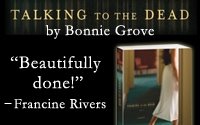When my husband and I married twelve years ago, he was plain Steve Grove. A cute guy with dark hair and blue eyes that crinkled in the corners when he smiled.
Things change.
He is now the Reverend Steve Grove, soon to be Reverend Doctor Stephen Grove. These changes took time, but even I am feeling a whiplash suddenness. It's changing, and the time it took to make these shifts has slipped away too quickly. I'm not yearning for plain Steve Grove (he's too down to earth to bother letting titles go to his head), rather I'm mulling over the nature of change. The slow but sudden, the remarkable (YOU are a doctor? Of what?), and the way time turns to dust in our hands regardless of accomplishment or inaction.
Things change.
I'm planning a novel at the moment. This is the playground part of writing when the prison walls of premise and purpose are yet to be erected, and inside of my mudpie story, I'm contemplating change. The goal of story is to move the hero from point A to point B in as interesting manner as possible. To demonstrate the breadth of human capacity for change (or, in some cases to highlight forces that cut us off at the knees). The task I find most challenging isn't deciding on point A and point B, but how to move the hero through to the end in an organic, non-forced way. The challenge then is this: move not only the hero, but every character in the story toward a different version of the same change.
When you see your story as an organic whole, connected at the marrow one character to another, you can find ways of moving characters through change (small and large, internal and external, psychological and moral) that make complex, breathtaking sense (adjectives appearing in this sentence are written with a fingers and toes crossed sense of pretty please, pretty please, hopefulness).
Things change.
The trick, me thinks, to creating realistic character change is twofold. First, the writer must ensure that all the characters are in psychological and moral change, and secondly, must not hold to tightly to point B, that arrival point of change. It may be that the hero changes from being a lout to prince charming, but that description can, if allowed, cover a lot of ground. There is room for interpretation of what it means to be a prince charming, of what that might look like for the lout we have come to love.
My prince charming has changed. He has all sorts of titles before his name, and any number of letters following. He is a smarty pants, no doubt. But he is a jeans wearing, play on the floor with the kids, kiss your wife a hundred times a day kind of smarty pants. Reverend Doctor, but still, in his heart, plain Steve Grove. His academic pursuits have changed him even at his core, but those changes have been organic, unfolding. And we, his family, have changed with him. He still has dark hair, and blue eyes that crinkle when he smiles, but nowadays, those crinkles are more permenant.
Things change.
The challenge for the writer, then, is to observe the nuances of change, it's causes, it's motivations, it's ripple effect, and find ways to translate that to story.
I bid you good writing.
Subscribe to:
Post Comments (Atom)









No comments:
Post a Comment